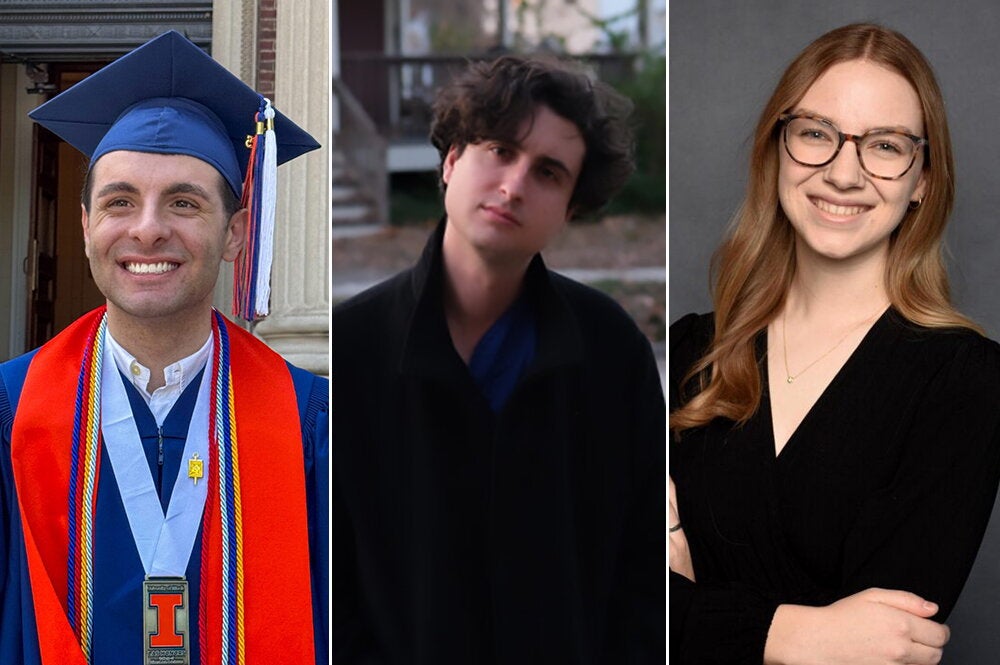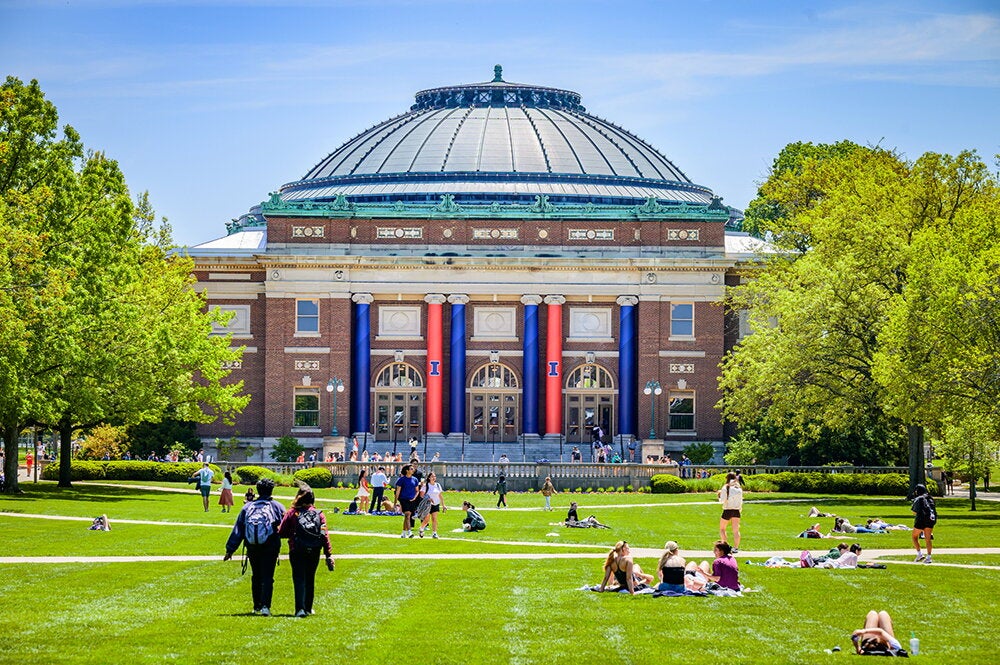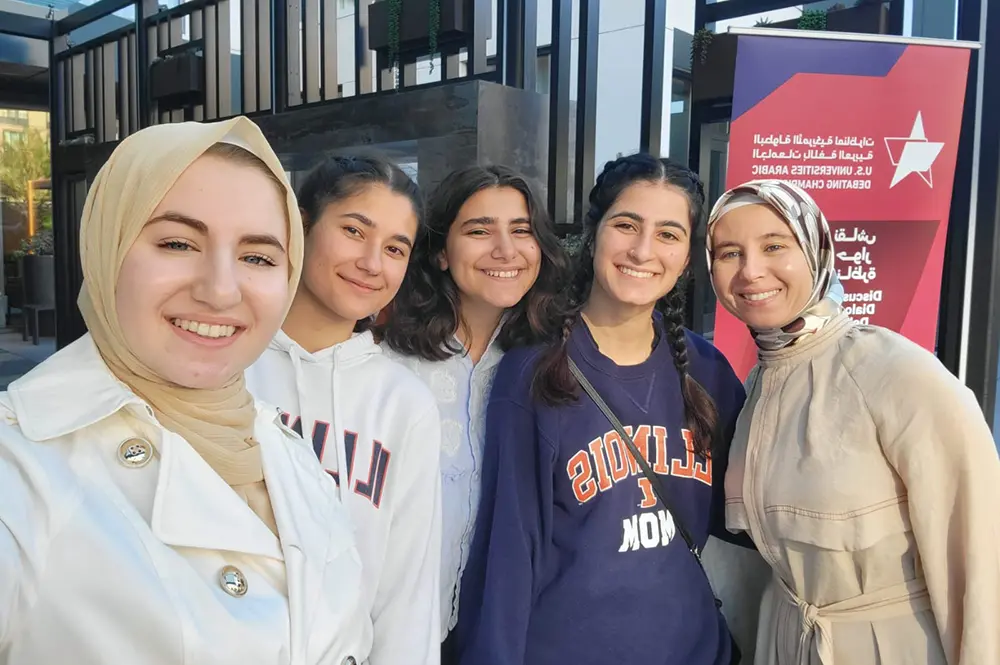
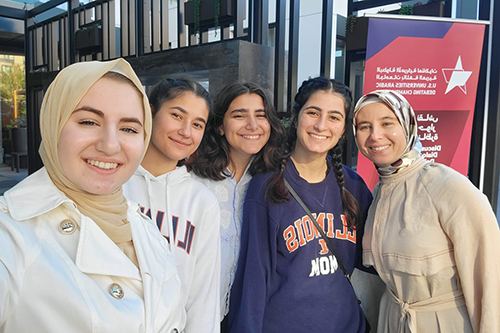
If you’ve ever stood in front of a room full of people to take part in a debate, you know what a nerve-wracking experience it can be. Now, imagine doing it in another language.
That’s the challenge some students are tackling – and surmounting – as part of the Arabic Debate Team at the University of Illinois Urbana-Champaign.
“The whole idea [of debating in Arabic in the United States] is new,” said linguistics professor Eman Saadah, who serves as mentor and coach for the team. “When I came across it, I was excited because I saw the value of helping students experience Arabic in a different setting outside of the classroom.”
The team dates back to 2019, when Saadah assembled and coached her first team of students. Saadah, who also serves as director of the Less Commonly Taught Languages Program, director and language coordinator of Arabic, and advisor for the minor in Arabic studies, is uniquely positioned to scout out new team members.
“Recruitment mainly happens in our advanced Arabic classes… just watching and seeing the improvement in students from the time we started until the end,” said Saadah. “Although I hope there’s no end, [that] it’s a continuous journey.”
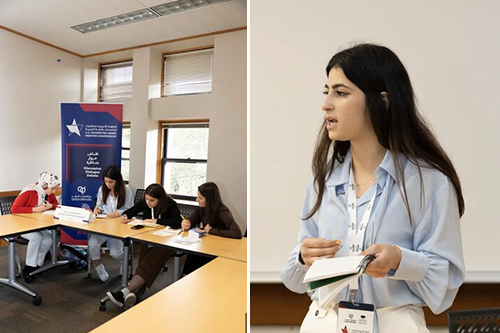
This year’s team consists of Shireen Aydogan, a junior majoring in molecular and cellular biology; Suad El-Jawhari, a senior majoring in economics and minoring in Arabic studies; Foziea Garada, a sophomore majoring in computer science; and Malaak Saadah, who graduated in May after studying materials science and engineering.
The group spent the semester preparing for a single national competition held annually by Qatar Debate, a member of the Qatar Foundation for Education, Science and Community Development. They met twice a week leading up to the 3rd U.S. Universities Arabic Debating Championship, which took place at Stanford University in October this year.
“Considering there are only four of us, it often meant we couldn’t practice with two teams, but we at least got into the habit of being able to work together, because your chemistry is also quite important,” said El-Jawhari. “There were a couple team members who were very shy at first, but by the time the competition actually came around, they were the first ones to put out ideas, and sometimes it was about topics that only they knew about. It was wonderful seeing their growth.”
The four students made up one of 40 teams who participated in the debating championship. It was their third national competition – and their most successful one to date. The team ranked second in the Arabic as a Foreign Language (AFL) category, while El-Jawhari received first place in the same category.
“Last year, I actually came in 30th place,” she said. “So this year when I knew that we were going again, for me and some of the other team members, our goal wasn’t necessarily to come out on top and beat everybody else. It was to do better than we did last year and try to improve our own Arabic so that we could get the most out of the experience for ourselves.”
The fact that this wasn’t El-Jawhari’s first competition made her win all the more meaningful.
“I cried when I found out I won. You spend all of your time gearing up for this one competition. That's it. That's what decides how you train for the whole year,” said El-Jawhari. “And so being able to show what all of those months had done, it was just really beautiful for me, and it was something to be proud of.”
The moment was a big pride point for her coach and mentor, too.
“It was one of the happiest moments of my life as a teacher,” said professor Saadah. “It was basically the culmination of the work she put in. I was pushing her, but all of the work was done by her. Still, her success is my success.”
El-Jawhari said as proud as she is of her win, she couldn’t have done it alone.
“I’m always the last to speak, so the tone is set by the first and second speaker,” she said. “I wouldn’t have been able to succeed if it wasn’t for the hard work of my teammates, and we wouldn’t have placed second as a team if it wasn’t for this effort. I mean, just to have this commitment to show up twice a week for something that is not even related to your grade was very motivating for me. I always told them you are winning in my eyes, regardless of the outcome. So that medal was the cherry on top.”
While this year’s competition has come and gone, there’s still more work to do. El-Jawhari and professor Saadah said part of that is just spreading the word about their efforts.
“The only way to build a community is one individual at a time,” said El-Jawhari. “I encourage anybody who’s learning Arabic who might be even remotely interested to please contact one of us. We’ll either get you more information, help you with a starting point, or you may even make the team. You never know, but again, it just takes one person at a time.”
Along with building a culture of Arabic debate on campus and in the U.S. as a whole, they also hope to continue boosting the university’s reputation through their efforts.
“These are Ivy Leagues and [other] top-notch institutions that are participating [in these competitions],” said professor Saadah. “All of these teams know that whenever the University of Illinois is mentioned, there’s a solid team and a solid Arabic program behind it, and they definitely don’t want to be debating against our team!”

